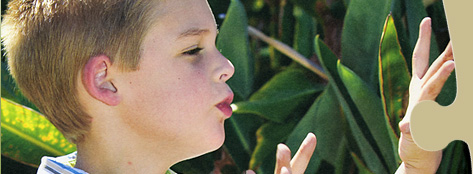
Receive Outreach Magazine
and other helpful information

Research & Medical Affairs
Discover our various sources of informationResearch Partners
SARRC continues to advance its research capabilities by building collaborative alliances with respected scientists and institutions. In recent years, SARRC has forged collaborations with the Translational Genomics Research Institute, Arizona State University, Steele Memorial Children's Research Center at the University of Arizona and the School of Occupational Therapy at A.T. Still University. SARRC also has partnered with Autism Speaks on the Autism Genetic Resource Exchange (AGRE) and the Clinical Trials Network (CTN), and forged global collaborations with entities like the University "Campus Bio-Medico" in Rome, Italy.
TGen
In late 2003, SARRC launched an unprecedented research collaboration with the Translational Genomics Research Institute (TGen) to conduct one of the largest and most comprehensive genetic and molecular studies on autism to date. The SARRC/TGen collaboration, led by Dietrich Stephan, Ph.D., director of the Neurogenomics Division at TGen, and Raun Melmed, M.D., co-founder and medical director of SARRC, focuses on gaining a better understanding of the architecture of the disorder, the factors that trigger it and the treatments that may cure it. TGen and SARRC are currently building on previous research with an extensive multi-pronged approach.
SARRC's partnership with TGen also helped make possible the selection of Arizona as the site for Phase I of the International Autism Genome Project. Sponsored by the National Alliance for Autism Research (NAAR), the project represents an unprecedented collaboration of 170 scientists and 50 institutions from around the world, who agreed to share their respective genomic databases on families with two or more members impacted by autism. TGen is leading the data collection and DNA analysis of the more than 6,000 samples.
Autism Speaks
SARRC is part of the Autism Speaks Clinical Trials Network, which was officially launched in 2005 by Cure Autism Now to focus on translational research, the critical step necessary to transfer findings from the laboratory to clinical application. Well controlled and appropriately blinded studies are needed to test whether anecdotal evidence holds. By facilitating data-sharing and multi-center trials, the goal of the network is to test the efficacies of treatment approaches as well as to rapidly screen new promising compounds that emerge from biomedical research, significantly decreasing the time and amount of money needed to develop them. When novel therapeutics are discovered, the CTN provides an existing network of sites with extensive experience in autism research where promising compounds can be rapidly tested for their efficacy in children with autism.
SARRC has joined forces with Autism Genetic Resource Exchange (AGRE) in furthering the investigation of genetic vulnerability to autism in families with one or more child affected by autism. Genetic data as well as descriptive data (IQ, adaptive functioning, specific impairments, social functioning, etc.) is collected from families around the country and housed in a central repository. The goal of AGRE is to facilitate more rapid progress in the identification of the genetic underpinnings of ASDs by making all research data available to the entire scientific community.
Arizona State University
School of Social and Family Dynamics
A.T. Still University
School of Occupational Therapy
University "Campus Bio-Medico," Rome, Italy